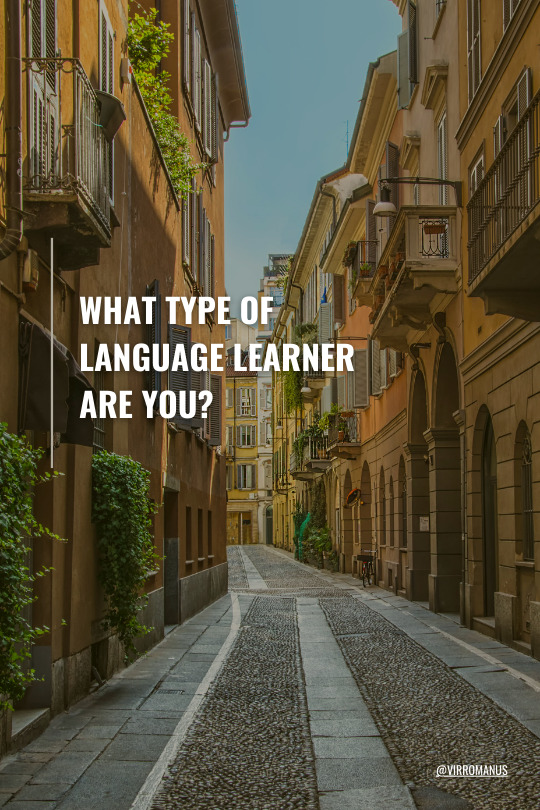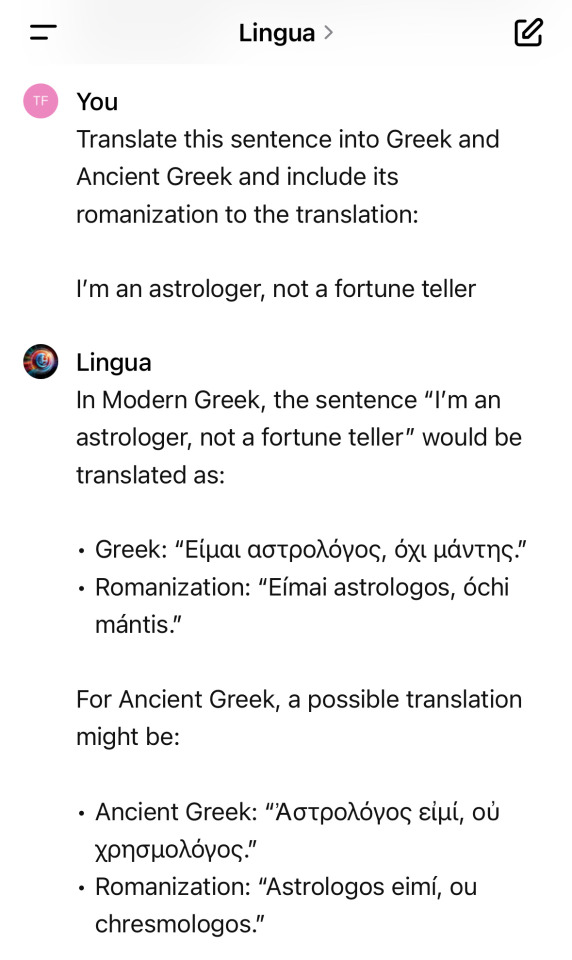Text
10 Latin Phrases And Their Spanish Equivalents Still In Use Today
1. Latin: Ad infinitum - Spanish: Al infinito
Meaning: Endlessly, without limit.
2. Latin: Corpus delicti - Spanish: Cuerpo del delito
Meaning: The fact of a crime having been actually committed.
3. Latin: Cum laude - Spanish: Con elogios
Meaning: With praise.
4. Latin: De facto - Spanish: De hecho
Meaning: In fact, or in effect, whether by right or not.
5. Latin: In situ - Spanish: En el sitio
Meaning: In the original place.
6. Latin: In vitro - Spanish: En el vidrio
Meaning: Outside the living body and in an artificial environment.
7. Latin: Modus operandi (M.O.) - Spanish: Modo de operar
Meaning: Method of operating.
8. Latin: Per capita - Spanish: Por cabeza
Meaning: Per person.
9. Latin: Quid pro quo - Spanish: Algo por algo
Meaning: Something for something; a favor for a favor.
10. Latin: Vice versa - Spanish: Viceversa
Meaning: The positions being reversed.
#latin language#latin linguistics#learning latin#roman#spanish language#spanish linguistics#spanish#latin#latin phrases#latin proverbs#learn spanish
30 notes
·
View notes
Text
What Type of Language Learner Are You?

There are many ways to learn a language and you may just have your own styles and approaches in learning your target language, specifically Italian or Latin. Here are some common learning styles you might relate to:
The Social Learner: You thrive in group settings and benefit immensely from language exchanges and conversational practice. You prefer interacting with native speakers and other learners, and often use language learning as a means to make new friends.
The Analytical Learner: You love dissecting the language, understanding the rules of grammar, and building a strong foundation in the mechanics of the language. You often prefer structured lessons and enjoy the process of translating complex texts to grasp the nuances of the language. Also, you tend to ask many questions in class about the grammar rules, and sometimes, certain grammar rules may not even have a reason for their existence!
The Auditory Learner: You learn best by listening. Podcasts, songs, and dialogues are your go-to methods. Speaking and repetition play crucial roles in reinforcing your learning. If you are this type of learner, you usually excel in understanding spoken language and pronunciation. You might even pick up an accent along the way!
The Visual Learner: Visual aids like movies, flashcards, and charts are essential for you. You find visual context helpful in remembering vocabulary and grammar structures. Apps that incorporate a lot of visual learning tools are particularly appealing to them. Visualisation may help you remember new and foreign alphabets or characters easily if you put your heart and soul into learning the language.
The Kinesthetic Learner: You have the need to be physically involved in the learning process. This might involve writing out words repeatedly, using gestures to remember phrases, or moving around while reciting vocabulary. Engaging the body helps you to retain information more effectively.
The Solitary Learner: Prefers studying alone and using self-study resources. Books, apps, and online courses allow you to learn at your own pace, exploring the parts of the language that interest you the most without external pressure.
The Mixed Learner: Many learners do not fit neatly into one category but are a mix of different styles depending on their mood, the language they are learning, or their goals. If you are this type of learner, you tend to adapt your learning style to suit your needs, which can vary from one learning session to another. This versatile learning approach can be especially helpful in maintaining interest and motivation, as you're able to switch up your approach based on what feels most effective or engaging at any given time.
So, what is your language learning style?
Let us know in the comments.
#language learning#latin language#italian language#learning italian#learning latin#romance languages#language lessons#learning styles#language learner#languages#duolingo#lingQ#memrise
5 notes
·
View notes
Text

Thank you @sockeyeseth and everyone who got me to 50 reblogs!
20 Latin Phrases And Their Italian Equivalents Still In Use Today
Latin: "Carpe Diem" - Seize the day. Italian: "Cogli l'attimo" - Catch the moment.
Latin: "Veni, Vidi, Vici" - I came, I saw, I conquered. Italian: "Venni, Vidi, Vinsi" - I came, I saw, I won.
Latin: "In vino veritas" - In wine, there is truth. Italian: "Nel vino c'è la verità" - In wine, there is truth.
Latin: "Aqua vitae" - Water of life. Italian: "Acqua della vita" - Water of life.
Latin: "Caveat Emptor" - Let the buyer beware. Italian: "Acquirente, attento" - Buyer, be careful.
Latin: "Homo Sapiens" - Wise man. Italian: "Uomo sapiente" - Wise man.
Latin: "Ad Astra" - To the stars. Italian: "Verso le stelle" - Towards the stars.
Latin: "Ars longa, vita brevis" - Art is long, life is short. Italian: "L'arte è lunga, la vita è breve" - Art is long, life is short.
Latin: "Tempus fugit" - Time flies. Italian: "Il tempo vola" - Time flies.
Latin: "Amor Vincit Omnia" - Love conquers all. Italian: "L'amore vince tutto" - Love wins everything.
Latin: "Memento Mori" - Remember that you must die. Italian: "Ricorda che devi morire" - Remember that you have to die.
Latin: "Alea iacta est" - The die is cast. Italian: "Il dado è tratto" - The die is cast.
Latin: "Verbatim" - Word for word. Italian: "Parola per parola" - Word for word.
Latin: "Vox Populi" - Voice of the people. Italian: "Voce del popolo" - Voice of the people.
Latin: "Mea Culpa" - My fault. Italian: "Colpa mia" - My fault.
Latin: "Tabula Rasa" - Clean slate. Italian: "Tavola rasata" - Clean slate.
Latin: "Non sequitur" - It does not follow. Italian: "Non segue" - It doesn't follow.
Latin: "Per se" - By itself. Italian: "Di per sé" - By itself.
Latin: "Status Quo" - The existing state. Italian: "Stato Quo" - The existing state.
Latin: "De facto" - In fact, in reality. Italian: "Di fatto" - In fact.
315 notes
·
View notes
Text
20 Useful Italian Phrases to use when at the Hotel
In a Hotel
Posso vedere la camera prima di decidere? - Can I see the room before deciding?
La camera ha una bella vista? - Does the room have a good view?
C'è un servizio di sveglia disponibile? - Is there a wake-up service available?
Posso avere un altro cuscino? - Can I have another pillow?
Dove si trova la palestra/l'area fitness? - Where is the gym/fitness area?
C'è un ristorante in hotel? - Is there a restaurant in the hotel?
Posso lasciare il mio bagaglio qui dopo il check-out? - Can I leave my luggage here after check-out?
C'è un servizio di lavanderia? - Is there a laundry service?
A che ora si serve la colazione? - What time is breakfast served?
C'è una piscina? - Is there a pool?
La camera include un cassaforte? - Does the room include a safe?
C'è un costo aggiuntivo per il Wi-Fi? - Is there an additional cost for Wi-Fi?
Potete prenotare un taxi per domani? - Can you book a taxi for tomorrow?
Posso avere una mappa della città? - Can I have a map of the city?
Dove posso parcheggiare la mia auto? - Where can I park my car?
La camera ha il controllo della temperatura? - Does the room have temperature control?
C'è un servizio di stanza disponibile? - Is room service available?
C'è una tariffa per i servizi aggiuntivi? - Is there a fee for additional services?
Posso avere informazioni sui tour locali? - Can I have information about local tours?
C'è un medico disponibile? - Is there a doctor available?
#italian language#learning italian#italian#italian linguistics#italian for travel#useful italian phrases#travelling to italy
4 notes
·
View notes
Text
20 Useful Italian Phrases to be Used at the Airport
At the Airport
Dove posso fare il check-in per il volo internazionale? - Where can I check in for the international flight?
Quanto tempo prima devo essere al gate? - How early do I need to be at the gate?
Dove posso trovare un carrello per i bagagli? - Where can I find a luggage cart?
Posso avere assistenza per i passeggeri a mobilità ridotta? - Can I get assistance for passengers with reduced mobility?
C'è un ritardo previsto per il volo a Milano? - Is there a delay for the flight to Milan?
Dove si trova la sala d'attesa? - Where is the lounge?
Quanto costa l'accesso alla sala VIP? - How much is access to the VIP lounge?
Dove posso ottenere informazioni sul mio volo? - Where can I get information about my flight?
C'è un ritardo? - Is there a delay?
Dove si trova il controllo passaporti? - Where is passport control?
Dove posso acquistare un biglietto per il treno/aereo? - Where can I buy a train/plane ticket?
C'è un'area gioco per i bambini? - Is there a play area for children?
Posso portare questi articoli nel bagaglio a mano? - Can I bring these items in my carry-on?
Ho perso il mio bagaglio, a chi posso parlare? - I've lost my luggage, who can I speak to?
Dove posso fumare? - Where can I smoke?
C'è una connessione Wi-Fi qui? - Is there Wi-Fi here?
Dove posso ricaricare il mio telefono? - Where can I charge my phone?
C'è un posto qui dove posso mangiare velocemente? - Is there a place here where I can eat quickly?
Posso avere una mappa dell'aeroporto? - Can I have a map of the airport?
Dove posso prendere un taxi? - Where can I get a taxi?
#italian language#learning italian#italian#italian linguistics#italian for travel#useful italian phrases#travelling to italy
8 notes
·
View notes
Text
20 Useful Italian Phrases to be Used at a Restaurant
At a Restaurant
Posso avere il menù? - May I have the menu?
Che cosa ci consiglia di speciale oggi? - What do you recommend today?
Avete piatti vegetariani? - Do you have any vegetarian dishes?
Potrei vedere la lista dei vini? - Could I see the wine list?
Posso ordinare ora? - Can I order now?
Potrei avere questa pietanza senza...? - Could I have this dish without...?
Questo è sufficientemente caldo per i bambini? - Is this mild enough for children?
Potete farlo meno condito? - Can you make it less spicy?
Ho una allergia a... - I'm allergic to...
Potremmo avere più pane, per favore? - Could we have more bread, please?
Questo piatto contiene glutine/lattosio/noci? - Does this dish contain gluten/lactose/nuts?
Possiamo dividere il conto? - Can we split the bill?
Posso avere un caffè/espresso? - Can I have a coffee/espresso?
Potrei avere il dessert? - Could I have the dessert?
Avete un menu per bambini? - Do you have a children's menu?
Potrei avere un bicchiere d'acqua? - Could I have a glass of water?
Questo piatto è fatto al momento? - Is this dish made fresh?
Potete raccomandare un piatto locale? - Can you recommend a local dish?
Posso avere la ricevuta, per favore? - Can I have the receipt, please?
Grazie, è stato delizioso! - Thank you, it was delicious!
#italian language#learning italian#italian#italian linguistics#italian for travel#useful italian phrases#travelling to italy
5 notes
·
View notes
Text
Forgive me for my imperfect Italian 🇮🇹
I’m still learning this in conjunction with Latin 😅
#latin language#italian language#romance languages#learning italian#italian linguistics#learning latin#italian#why I learn Italian
6 notes
·
View notes
Text

A sample of how powerful this tool is in its precision with translations thus far 😎
Hi friends, ladies and gentlemen! I have created a powerful GPT called Lingua, which is able to translate any text up to 30 different languages as you wish it to translate with immense accuracy.
In addition, it can also detect any language school near your residence or location. Just type in your specific location and this app will give you a list of the nearest schools you can study your target language!
Go give that a try and please leave your reviews. We will continue to improve the GPT as time goes on.
2 notes
·
View notes
Text
Hi friends, ladies and gentlemen! I have created a powerful GPT called Lingua, which is able to translate any text up to 30 different languages as you wish it to translate with immense accuracy.
In addition, it can also detect any language school near your residence or location. Just type in your specific location and this app will give you a list of the nearest schools you can study your target language!
Go give that a try and please leave your reviews. We will continue to improve the GPT as time goes on.
2 notes
·
View notes
Text
20 Intermediate Italian Phrases for Travelling Around Italy
Dov'è la stazione? (Where is the train station?) - Pronunciation: doh-veh lah stah-tsee-oh-neh - Phonetic: /doˈvɛ la staˈtsjoːne/
Potrebbe aiutarmi? (Could you help me?) - Pronunciation: poht-rehb-beh ah-yoo-tar-mee - Phonetic: /potˈrebbe ajˈutarmi/
Posso avere il menù, per favore? (Can I have the menu, please?) - Pronunciation: pohs-soh ah-veh-reh eel meh-noo, pehr fah-voh-reh - Phonetic: /ˈposso aˈvere il meˈnu, per faˈvore/
Quanto dista? (How far is it?) - Pronunciation: kwahn-toh dees-tah - Phonetic: /ˈkwanto ˈdista/
Posso pagare con la carta? (Can I pay with a card?) - Pronunciation: pohs-soh pah-gah-reh kohn lah kahr-tah - Phonetic: /ˈposso paˈɡare kon la ˈkarta/
Un biglietto di andata e ritorno, per favore. (A round-trip ticket, please.) - Pronunciation: oon bee-lyet-toh dee ahn-dah-tah eh ree-tor-noh, pehr fah-voh-reh - Phonetic: /un biʎˈʎetto di anˈdata e riˈtorno, per faˈvore/
Che ore sono? (What time is it?) - Pronunciation: keh oh-reh soh-noh - Phonetic: /ke ˈore ˈsono/
Posso vedere la mappa? (Can I see the map?) - Pronunciation: pohs-soh veh-deh-reh lah mahp-pah - Phonetic: /ˈposso veˈdere la ˈmappa/
C'è una guida in inglese? (Is there a guide in English?) - Pronunciation: cheh oo-nah gwee-dah een een-gleh-seh - Phonetic: /tʃɛ uˈna ˈɡwida in inˈɡleːze/
Mi sono perso/a. (I am lost.) - Pronunciation: mee soh-noh pehr-soh/ah - Phonetic: /mi ˈsono ˈperso/ˈpersa/
Potete chiamare un taxi? (Can you call a taxi?) - Pronunciation: po-teh-teh kyah-mah-reh oon tahk-see - Phonetic: /poˈtete ˈkjaːmare un ˈtaksi/
C'è una fermata dell'autobus qui vicino? (Is there a bus stop nearby?) - Pronunciation: cheh oo-nah fehr-mah-tah del-ow-toh-boos kwee vee-chee-noh - Phonetic: /tʃɛ ˈuna ferˈmata delˈlautobus qui viˈtʃino/
Quanto tempo ci vuole per arrivare a...? (How long does it take to get to...?) - Pronunciation: kwahn-toh tem-poh chee vwaw-leh pehr ah-rree-vah-reh ah... - Phonetic: /ˈkwanto ˈtempo tʃi ˈvwɔle per arriˈvare a.../
Posso avere una mappa della città? (Can I have a city map?) - Pronunciation: pohs-soh ah-veh-reh oo-nah mahp-pah del-lah chee-tah - Phonetic: /ˈposso aˈvere ˈuna ˈmappa ˈdella tʃitˈta/
Ho prenotato una camera. (I have booked a room.) - Pronunciation: oh preh-noh-tah-toh oo-nah kah-meh-rah - Phonetic: /o prenoˈtato ˈuna ˈkamera/
Dove posso comprare un biglietto? (Where can I buy a ticket?) - Pronunciation: doh-veh pohs-soh kom-prah-reh oon bee-lyet-toh - Phonetic: /ˈdove ˈposso komˈprare un biʎˈʎetto/
Posso avere il conto? (Can I have the bill?) - Pronunciation: pohs-soh ah-veh-reh eel kohn-toh - Phonetic: /ˈposso aˈvere il ˈkonto/
C'è Wi-Fi qui? (Is there Wi-Fi here?) - Pronunciation: cheh wee-fee kwee - Phonetic: /tʃɛ ˈwiːfi qui/
Dove posso trovare un bancomat? (Where can I find an ATM?) - Pronunciation: doh-veh pohs-soh troh-vah-reh oon bahn-koh-maht - Phonetic: /ˈdove ˈposso troˈvare un baŋkoˈmat/
C'è uno sconto per gruppi? (Is there a group discount?) - Pronunciation: cheh oo-noh skon-toh pehr groop-pee - Phonetic: /tʃɛ ˈuno ˈskonto per ˈgruppi/
#learning italian#italian language#italian#italiano#travelling in italy#travel#travelling solo#italian travel phrases#italian phrases#italian linguistics#italian phonetics#intermediate italian
8 notes
·
View notes
Text
20 Basic Italian Phrases for Beginners
Buongiorno (Good morning) - Pronunciation: bwohn-johr-noh - Phonetic: /bwɔnˈdʒorno/
Buonasera (Good evening) - Pronunciation: bwoh-nah-seh-rah - Phonetic: /bwɔnaˈsɛra/
Buonanotte (Good night) - Pronunciation: bwoh-nah-noht-teh - Phonetic: /bwɔnaˈnɔtte/
Per favore (Please) - Pronunciation: pehr fah-voh-reh - Phonetic: /per faˈvore/
Grazie (Thank you) - Pronunciation: grah-tsee-eh - Phonetic: /ˈɡrat.t͡sje/
Prego (You're welcome) - Pronunciation: preh-goh - Phonetic: /ˈpreɡo/
Mi scusi (Excuse me) - Pronunciation: mee skoo-zee - Phonetic: /mi ˈskuːzi/
Sì (Yes) - Pronunciation: see - Phonetic: /si/
No (No) - Pronunciation: noh - Phonetic: /no/
Non capisco (I don't understand) - Pronunciation: nohn kah-pees-koh - Phonetic: /non kaˈpisko/
Parla inglese? (Do you speak English?) - Pronunciation: par-lah een-gleh-seh - Phonetic: /ˈparla iŋˈɡleːze/
Come ti chiami? (What's your name?) - Pronunciation: koh-meh tee kyah-mee - Phonetic: /ˈkome ti ˈkjaːmi/
Mi chiamo... (My name is...) - Pronunciation: mee kyah-moh - Phonetic: /mi ˈkjaːmo/
Quanto costa? (How much does it cost?) - Pronunciation: kwahn-toh koh-stah - Phonetic: /ˈkwanto ˈkosta/
Dove il bagno? (Where is the bathroom?) - Pronunciation: doh-veh eel bahn-yoh - Phonetic: /ˈdove il ˈbaɲɲo/
Aiuto! (Help!) - Pronunciation: ah-yoo-toh - Phonetic: /aˈjuto/
Posso avere...? (Can I have...?) - Pronunciation: pohs-soh ah-veh-reh - Phonetic: /ˈposso aˈvere/
Buon appetito! (Enjoy your meal!) - Pronunciation: bwohn ah-peh-tee-toh - Phonetic: /bwɔn appeˈtito/
Che bello! (How beautiful!) - Pronunciation: keh behl-loh - Phonetic: /ke ˈbɛllo/
Alla prossima! (Until next time!) - Pronunciation: al-lah pross-ee-mah - Phonetic: /ˈalla ˈprɔssima/
#learning italian#italian#italiano#italian language#italian phonetics#italian linguistics#italian phrases
11 notes
·
View notes
Text
In Italian, you pronounce every letter of every word except for the letter “H” only if it appears at the beginning of a word.
#learning italian#italian#italian language#italian things#romance languages#italian linguistics#pronunciation
0 notes
Text
I started a TikTok channel! Like, Comment, Share and Follow me for more content on Italian, Latin and learning languages.
1 note
·
View note
Text
Mula
In antiquo Chinae regno, bellum gravem oriri coeperat. Omnes viri ad militiam conscribi debebant, sed pater Mulan, Fa Zhou, iam senex erat et infirmus. Mulan, filia eius, timens pro patre suo, consilium cepit.
Mulieris culturam relinquit, et ut virum se vestit, in exercitum secreto intrat, nomen Ping ferens. Nullus de vera eius natura suspicabatur.
In castris, Mulan duras exercitationes perpessus est et strenue pugnavit. Paulatim, a solido gerens, amicitiam cum Li Shang, tribuno militum, fecit. Is quoque non intellexit, Mulan feminam esse.
Interim, Huns, populus hostis, imperio invadere inceptum est. Exercitus imperatoris prompte ad resistendum paratus est. Mulan, cogitans ingeniose, consilium capit, ut ab hostibus deprehensum exercitum salvum duceret.
In pugna finali, Mulan demonstravit virtutem et astutiam suam, et Huns vincitur. Tamen, in proelio, vera eius natura patefacta est. Li Shang, primum commotus, de virtute et fide Mulan miratus est.
Post victoriam, Mulan honore et gratia in exercitu donata est, sed a patria sua silenter recedidit. Revera, non erat honoribus publicis, sed amore et reverentia erga patrem et familiam ducitur.
Fa Zhou, recognoscens filiam suam, superba et laeta est. Mulan, quamvis non sequentur honorum splendor, vera heroina et filia patriae nunc appellatur.
Finis

#latin language#latin linguistics#learning latin#romance languages#latin#latin fairy tales#latin literature#latin stories#fairy tales#mulan#hua mulan
2 notes
·
View notes
Text
Latin Fairy Tales Series: 'Rapunzel'
Regina, quae in villa proxima habitabat, magnam desiderium habebat plantarum, quae crescere in horto eius non poterant. Hinc, cum vidisset in horto vicino magnam rapunculam, animum cepit, ut eam habere vellet. Sed hortus erat custoditus a mago malo, qui rapunculam colere solebat.
Regina marito suo narravit de suo desiderio, et ille, amore suae uxoris adductus, adhortatus est eam, ut magum roget. Mulier, animo praesumpto, magum invocavit, sed ipse iratus respondit, "Rapunculam non potes habere, nisi pro filio tuo."
Tempore postea regina peperit filiam, quam Rapunzel nominavit. Mox magus, ut filiam acciperet, venit. Regina Rapunzellem tradidit et magus eam in alta turri clausit, ubi nullus aditus erat.
Rapunzel crescebat in turri solitaria et pulchrior fiebat die post die. Crines eius longi et aurei erant, et vox eius dulcis erat.
Veniebat magus per funem, quem in fenestra iaciebat, ut Rapunzellem visitaret. "Rapunzel, Rapunzel, pecten tuum ad me iace," dicebat ille. Tum Rapunzel crinem suum demittebat, et magus ad fenestram ascendebat.
Haec ita fiebant per multos annos, donec unum diem princeps per silvam transiret. Audito cantu dulci, sequebat sonum ad turrim, ubi Rapunzel habitabat.
Princeps vidit magum, qui per funem ascendebat, et curiosus erat. Itaque, cum magus discessisset, princeps ad turrim ascendeit. "Rapunzel, Rapunzel, pecten tuum ad me iace," clamavit. Rapunzel non illum noverat, sed tamen pecten suum ad eum iacuit.
Amor princeps et Rapunzel inter se crescebat, et princeps eam saepe visitabat. Tandem, in conspectu princepis, Rapunzel suam veram originem cogitavit.
Unum diem, in quodam colloquio, Rapunzel principi de sua vera origine dixit. Princeps magnopere commotus est et rapunculam utrici suae desideravit.
Princeps, cupiens reginam reconciliare, ad magum perrexit et eum in custodiam tradidit. Rapunzel et princeps matrimonium contraxerunt, et rex et regina eis benevolentiam praestabant.
Finis

#latin language#latin linguistics#learning latin#romance languages#latin#latin literature#rapunzel#latin fairy tales#fairy tales
4 notes
·
View notes
Text
Latin Fairy Tales Series: 'Cinerellae'
Cinerella erat puella bona et misera, quae cum patre suo in magna domo habitabat. Pater eius duxit uxorem novam, quae duos filios habebat. Illa mulier maligna et filii eius crudeli erant erga Cinerellam. Eam in domo laborare iusserunt, ut ancilla.
Cinerella per diem multas labores patiebatur et per noctem in parvo cubiculo dormiebat, cinis in ore, unde nomen ei Cinerella.
Unum diem, rex magnus iubilum celebrabat. In omni regione, filii principum et nobilium ad festum invitabantur. Cinerella tristis erat, quod non poterat ire, et lachrimas fudit.
Subito, apparebat fata, quae Cinerellae pulchrum vestitum et calceos aureos dabat. "Hoc tibi dono," dixit, "sed ad festum reverti debes antequam media nox advenerit."
Cinerella gaudebat et ad festum properabat. Eius vestitus splendidus erat et calcei aurei fulgebant. Omnes mirabantur eam, nec cognoverunt eam propter pulchritudinem.
In festo, rex filium suum iubebat nuptias facere. Omnes puellae in spectaculo erant, sed rex non poterat reperire puellam, cuius pes calceus aureus aptus esset.
Tum Cinerella advenit et pedem suum ostendit. Calceus aureus ei erat aptus. Rex gavisus est et Cinerellam in uxorem duxit.
Cinerella regina facta est et multum felix vixit. Malus famulus et filii malitiosi eius familiam reliquerunt. Cinerella vero semper laeta et benigna mansit.
Finis

#latin language#latin linguistics#learning latin#latin#romance languages#latin fairy tales#fairy tales#latin stories#cinderella#latin literature#latin poetry
4 notes
·
View notes
Text
Latin Fairy Tales Series: 'Tres Porcelli'
Tres Porcelli
Tres porcelli in silva habitabant. Unus erat parvus, alius mediocris, et tertius magnus. Unus domum struxit e stramentis, alius e ligno, et tertius e lateribus. Lupo autem malo timebant.
Primo porcellus, qui domum e stramentis aedificavit, sed non firmam, lupum vidit venientem. "Surgite!" clamavit, "Lupus adest! Ad meam domum properate!" Porcelli celeriter intraverunt, et porculus portam clausit.
Lupus ad domum appropinquavit et, "Porcelli, porcelli, sinite me intrare!" clamavit. Sed porcellus, qui domum stramentis aedificavit, dixit, "Non sinam! Neque morsu neque celeritate me superabis!"
Tum lupus impetum fecit et domum e stramentis disrupit. Porcellus autem fugit ad domum secundi porcelli.
Secundo porcello, qui domum e ligno aedificavit, lupus appropinquabat. "Surgite!" exclamavit, "Lupus adest! Ad meam domum properate!" Porcelli celeriter introierunt, et porcelli portam clausit.
Lupus ad domum accessit et, "Porcelli, porcelli, sinite me intrare!" rogavit. Porcelli autem, qui domum e ligno aedificavit, responderunt, "Non sinemus! Neque morsu neque celeritate nos superabis!"
Tum lupus impetum fecit et domum e ligno demolitus est. Porcelli autem fugerunt ad domum tertii porcelli.
Tertio porcello, qui domum e lateribus construxerat, lupus appropinquabat. "Surgite!" clamavit, "Lupus adest! Ad meam domum properate!" Porcelli celeriter introierunt, et porcelli portam clausit.
Lupus ad domum venit et, "Porcelli, porcelli, sinite me intrare!" vocavit. Porcellus autem, qui domum e lateribus aedificavit, dixit, "Non sinam! Neque morsu neque celeritate me superabis!"
Tum lupus impetum fecit et domum frustra petiit. Domus enim e solidis lateribus erat aedificata. Lupus frustratus est et ad casam suam regressus est.
Porcelli autem gaudebant quod domum bene aedificaverant et periculum evaserant.
Finis

#three little pigs#fairy tales#latin fairy tales#latin#latin language#learning latin#latin literature#latin poems#latin linguistics#romance languages
1 note
·
View note